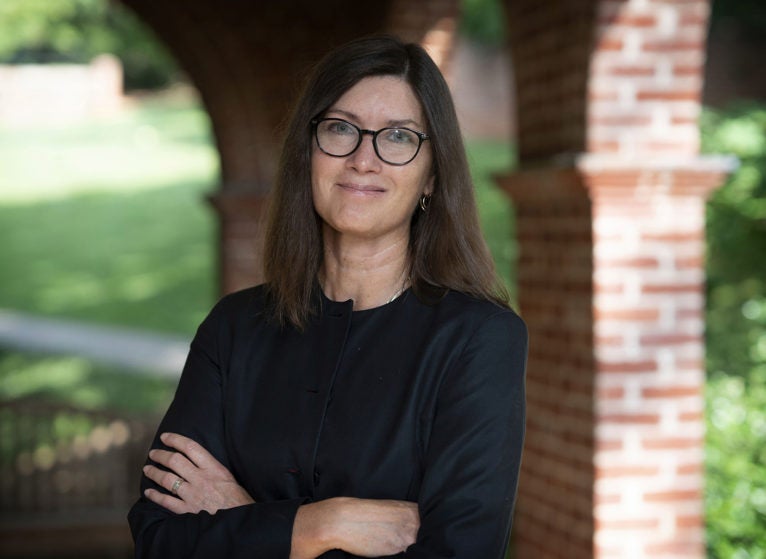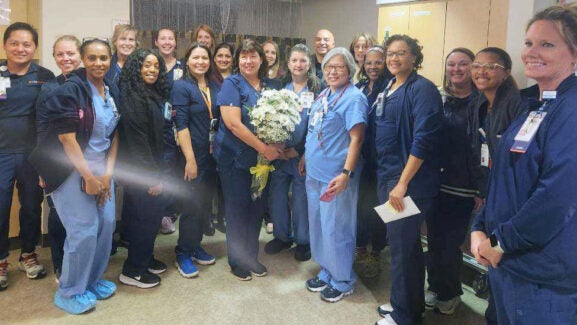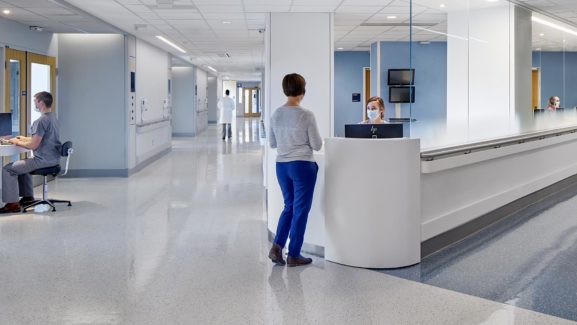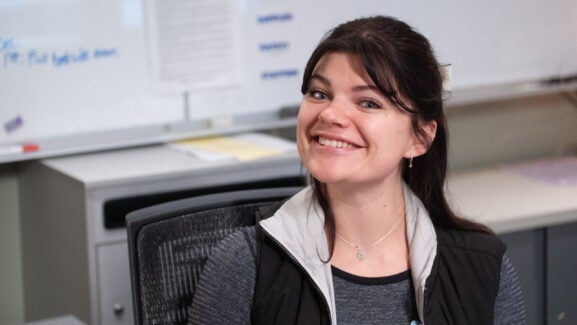

Susan Kirk, MD (Photo by Dan Addison, University Communications)
The Parker J. Palmer Courage to Lead Award Goes to: Susan Kirk, MD
UVA Designated Institutional Official, Associate Dean for Graduate Medical Education and Associate Professor of Endocrinology, Susan Kirk, MD, is a recipient of the 2023 Parker J. Palmer Courage to Lead Award. She is being recognized not only for excelling in her long-time role overseeing UVA’s GME program, but also for implementing innovative strategies to support our aspiring residents and fellows. Dr. Kirk was nominated by Associate Designated Institutional Officer, Bradley Kesser, MD, with several exceptional letters of recommendation from residents and peers that made her a frontrunner for the recognition.
We spoke to Dr. Kirk about her long career at UVA and the significance of this award, which she describes as a lifetime achievement award. She says: “It really caps what has been a fantastic experience being part of the Graduate Medical Education community.”
Get to Know: Susan Kirk, MD
Can you tell us about your career history and how you ended up in your current position?
Kirk: I came to UVA in 1991 to train in endocrinology, and I stayed on here as faculty. I concentrated my clinical practice on endocrine disorders, working with high-risk obstetrics and, most recently, with our transgender patients. In 2005, I was approached by the CEO of the hospital who asked me to consider joining the administration of Graduate Medical Education. I had been involved with GME, especially with the medicine residency program, but this promotion was kind of a surprise. This role is not something I trained for; it’s not something I planned. But I took over in that top position in 2006.
What were some of your goals for improving the GME program?
Kirk: At the time, we had — and still have — a number of excellent residency and fellowship programs. These programs were outstanding on their own, but what they lacked was a cohesive core. So I think the main goal that I had at that point was to really bring together the GME community and make sure that they had the support they needed and could continue to succeed. My team and I put a lot of work into developing the infrastructure that supported our 120 programs and then more directly supported all of our residents and fellows.
What did you learn about yourself and about UVA as you stepped into this new role?
Kirk: I think what was apparent very early on was just how little I knew about the importance of our relationships to the government and to the accrediting bodies. You know, we always see the residents and fellows at work, but we don't realize how much goes on behind that. I really came in as a novice and I had to learn a whole new specialty you could say. And I guess one of the things that surprised me was how much I enjoyed that. I’d never really seen myself as an administrator. But being able to solve problems and put solutions in place is something I found really gratifying.
How did your experience as a clinician benefit you in this new role?
Kirk: I’ve never given up my role as endocrinologist. I think continuing to deliver patient care was really essential because otherwise I don’t think I could have understood what both the educators needed, as well as what the doctors needed in order to do their jobs well. So to be able to straddle both worlds and make sure that I could bring my own personal experience into what I was doing as associate dean I think was really important.
What is significant about this particular award?
Kirk: Well, there are two things about it. First of all, there are 900 sponsoring institutions. Most of them are community teaching hospitals. And then there's the 130 or 140 academic medical centers. And I think all of them are led by really sincere, smart, enthusiastic people who share my role. So to be recognized out of this group was just humbling.
But also, a team of people here worked really hard to put this nomination together. And that was, I think, the most significant thing to me. After a career of doing this, knowing that there were people who really believed that what I had done was meaningful was wonderful.
This award is truly a reflection of both my team and the GME office. I see it more as a team award. Because if I was working really hard, but the rest of the GME community didn’t care or was struggling, the ACGME would not have awarded this to me. It’s not an award that goes to individuals as much as recognizing the institutions that they’re leading.
I should also mention that I have a connection to the ACGME. I was on the Institutional Review Committee, which is the committee that accredits institutions. There are 12 DIOs who serve on this committee. And for my final 3 of the 7 years I was on the committee, I was the chair. While the main work was in accreditation, I was also able to serve as an advocate for all of the sponsoring institutions in the country. And I think, although this was not a nomination from my peers, that role gave me a lot of name recognition, which probably didn’t hurt.
You were given a chance to read your nominations. What was written in those letters that was meaningful or surprising for you?
Kirk: I think what surprised me the most is that others recognized the things I do that feel sort of foundational and occur behind the scenes to make sure that everybody can succeed in their training. I think what came out in the letter from the residents was that I really do care about their wellbeing. I think they have the toughest job in the hospital. They work 80 hours a week with one day off on weekends for 5 to 7 years. That's part of the deal that they sign up for, but it's hard. It's really stressful. And I want to make sure that we appreciate them because they are working so hard. There are a lot of things we do that don't necessarily get this banner type of attention. And the fact that the residents knew I was doing those things was the most important part of being nominated.
There will be an award presentation ceremony in February. Are you planning to attend?
Kirk: Yes. The ACGME has one annual conference each year, but the last one was on March 20, 2020. That was the last time many of us saw each other in person, and we have a very tightknit community. I had planned to go anyway just because it's so therapeutic to be among the people who are also in my position. One thing about us DIOs, we're not in it for the glory or the ego. You know, it's a lot of people who just enjoy what they do and roll up their sleeves. So barring an unforeseen COVID surge or something, I’m planning to go.
You’ve spent most of your career here at UVA. What is it that has made you want to stay?
Kirk: Of course, there’s the fact that Charlottesville is a great place to raise a family. We have a blended family of 5 children. I have two daughters, one of whom was born at UVA.
But also, I always felt very personally and professionally supported by the endocrine division, and my mentors in the clinical and academic arena. When I said, ‘I've got this idea and I'd like to try it,’ they would always say, ‘Yeah, let's do it.’ And it wasn't always successful. But I always had that support. I’ve been through many CEOs during my time here, but all have trusted me and allowed me to pursue things that I thought were in the best interest of the institution. So the support I’ve gotten has been the glue that’s kept me here.
Latest News




Congratulations Dr. Kirk! You are a great leader and teacher who is always humble.
Dr. Kirk is a superstar, extraordinarily competent and compassionate!
Dr. Kirk is so deserving of this recognition. I have worked with her and her team since I joined the Department of Medicine in 2007 and have watched her perform her role with extreme grace and finesse. She juggles multiples challenges and personalities every day and to watch her do her “GME Magic” is truly an inspiration. Well done Susan!